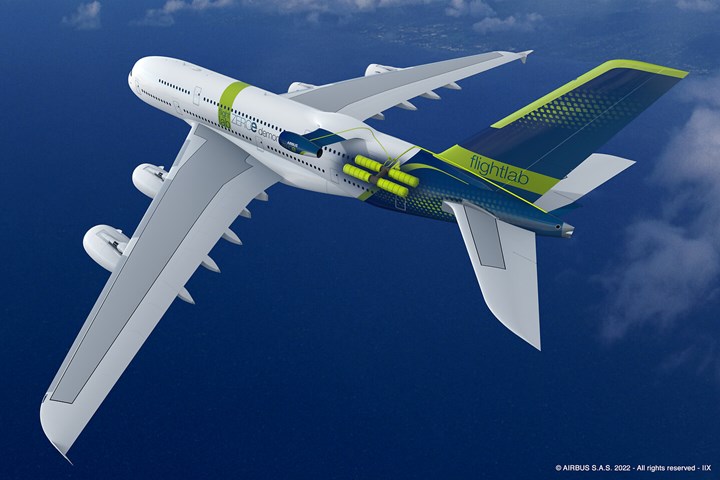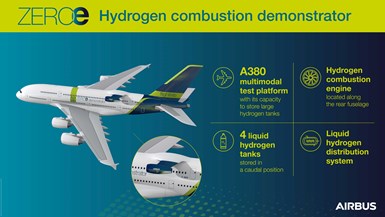Airbus, CFM International collaborate on hydrogen combustion technology
A380 flying testbed will be equipped with liquid hydrogen (LH2) tanks and modified turbofan engine to take flight around the middle of this decade.
As of Feb. 22, Airbus (Toulouse, France) signed a partnership agreement with CFM International (Cincinnati, Ohio, U.S.), a 50/50 joint company between GE Aviation (Cincinnati) and Safran Aircraft Engines (Courcouronnes, France), to collaborate on a hydrogen demonstration program that will take flight around the middle of this decade (get a more in-depth look at the demonstrator renditions)
The program’s objective is to ground and flight test a direct combustion engine fueled by hydrogen, in preparation for entry-into-service of a zero-emission aircraft by 2035. The demonstration will use an A380 flying testbed equipped with liquid hydrogen (LH2) tanks prepared at Airbus facilities in France and Germany established in June 2021. Airbus will also define the hydrogen propulsion system requirements, oversee flight testing and provide the A380 platform to test the hydrogen combustion engine in cruise phase.
CFM International will modify the combustor, fuel system and control system of a GE Passport turbofan to run on hydrogen. The engine, which is assembled in the U.S., was selected for this program because of its physical size, advanced turbo machinery and fuel flow capability. It will be mounted along the rear fuselage of the flying testbed to allow engine emissions, including contrails, to be monitored separately from those of the engines powering the aircraft. CFM will execute an extensive ground test program ahead of the A380 flight test.
“This is the most significant step undertaken at Airbus to usher in a new era of hydrogen-powered flight since the unveiling of our ZEROe concepts back in September 2020,” says Sabine Klauke, Airbus chief technical officer. “By leveraging the expertise of American and European engine manufacturers to make progress on hydrogen combustion technology, this international partnership sends a clear message that our industry is committed to making zero-emission flight a reality.”
According to Gaël Méheust, president and chief executive officer (CEO) of CFM, hydrogen combustion capability is one of the foundational technologies the company is developing and maturing as part of the CFM (Revolutionary Innovation for Sustainable Engines) RISE Program, whose technology roadmap mentions consideration of composite fan blades, heat-resistant metal alloys and ceramic matrix composites (CMC). CFM also shares Airbus’ ambition of fulfilling the promise it made in signing the Air Transport Action Group goal in October 2021 to achieve aviation industry net-zero carbon emissions by 2050 by developing and testing the technology necessary to make zero-emissions aircraft a reality within the ambitious timeline defined.
Airbus has a long-standing relationship with CFM and its parent companies, GE Aviation and Safran Aircraft Engines and, together, the partners have reportedly established a great track record of delivering high-performance products that meet the needs of airline customers.
Related Content
-
The state of recycled carbon fiber
As the need for carbon fiber rises, can recycling fill the gap?
-
Infinite Composites: Type V tanks for space, hydrogen, automotive and more
After a decade of proving its linerless, weight-saving composite tanks with NASA and more than 30 aerospace companies, this CryoSphere pioneer is scaling for growth in commercial space and sustainable transportation on Earth.
-
Materials & Processes: Resin matrices for composites
The matrix binds the fiber reinforcement, gives the composite component its shape and determines its surface quality. A composite matrix may be a polymer, ceramic, metal or carbon. Here’s a guide to selection.


















